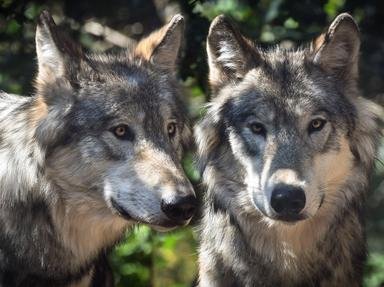Quiz Answer Key and Fun Facts
1. What name is given to the most subservient, lowest-ranking wolf in the pack?
2. When the female has pups she leaves the pack and looks after them on her own, not returning until the pups are old enough to travel and hunt with the pack.
3. Why do wolves howl?
4. What adaptation do wolves have to make it easier for them to walk on snow?
5. Which of these animals is unlikely to scavenge from a wolf's dinner (at least until the wolf is long gone)?
6. Which types of bird do wolves seem to have a special relationship with?
7. Wolf/dog hybrids make excellent pets that are more intelligent and easier to train than traditional domestic dogs.
8. Discipline and hierarchy are very important to keep the pack running smoothly, so dominant wolves need to keep the others in line. Threats are divided into two groups: "low intensity" and "high intensity". Which of these is a HIGH INTENSITY threat?
9. Packs that primarily hunt moose and caribou tend to be less territorial than those which primarily hunt smaller animals.
10. If a moose is being chased by a wolf, would jumping into a river help it to get away?
Source: Author
Charleyy
This quiz was reviewed by FunTrivia editor
crisw before going online.
Any errors found in FunTrivia content are routinely corrected through our feedback system.

